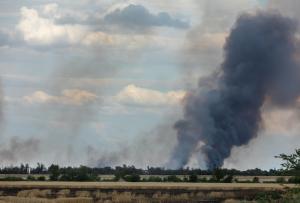In response to the huge impacts on the environment of the war in Ukraine, the United Nations Economic Commission for Europe (UNECE) and partners including UNEP, OECD, UNDP, UNIDO, the World Bank and OSCE are joining forces though an inter-agency group to coordinate the assessment of environmental damage. By helping to build up a more complete picture of environmental harm to date and as the situation evolves, this coordinated approach will help foster coherence, sharpen assessment methodologies, avoid duplication, and contribute to the robust evidence-base that will be needed for future recovery and reconstruction efforts.
“One year since the Russian Federation's 24 February invasion of Ukraine, the ongoing impacts of immense human suffering, massive displacement, and destruction of settlements, infrastructure, and the environment will be felt for many years to come. I express my solidarity with the people of Ukraine and all those affected by the war and call for the application of the UN General Assembly resolutions on Ukraine’s territorial integrity, the respect of the UN Charter and adherence to international law”, said UNECE Executive Secretary Olga Algayerova.
“As part of the response to the massive setbacks for sustainable development from twelve months of war, the international community can come together to support to the Government of Ukraine in identifying and assessing both the damage being done to the environment, and the measures necessary to remediate that damage, as far as that is possible,” she stressed.
The establishment of the group responds to the request by Ministers at the Ninth Environment for Europe Ministerial Conference held in Nicosia, Cyprus, in October 2022, to prioritize assessing the most urgent environmental needs in Ukraine, and to make recommendations to advance a sustainable recovery of the country, based on the results of ongoing and planned impact assessments, and the methodology of the UNECE Environmental Performance Review Programme.
In a Geneva seminar, the group, which was initiated by UNECE, provided a platform for different actors to share insights on findings and approaches taken so far by them to track environmental damage. Discussions underscored that strengthening coordination and fostering coherence between assessment approaches will be crucial to obtain a meaningful overall picture of environmental impacts.
The discussions brought together 120 stakeholders including from the Government and Parliament of Ukraine, government officials from other UNECE member States, United Nations entities, international organizations including OECD, OSCE and IUCN, multilateral development banks including the World Bank and Council of Europe Development Bank, and international and Ukrainian non-governmental organisations.
Taking stock of environmental impacts
The war in Ukraine has resulted in tens of thousands of lives being lost and the associated humanitarian crisis has led to many besieged and displaced people both within Ukraine and abroad. The economic impacts have also been significant. Estimates of the damage to infrastructure, housing and non-residential buildings exceed $100 billion, with vast destruction of homes, power stations, roads and railways, as well as agricultural land and other productive capacity of the country. The war has also caused widespread and severe damage to the environment and inflicted both immediate and longer-term consequences on the human health, ecosystems and the Ukrainian economy and beyond.
According to data shared by the Zoï Environment Network, the number of incidents with potential impacts on the environment has gone from below 1,000 in the last week of February 2022 to 4,000-5,000 per month during the last half year. Compared to full-month numbers for March to May 2022, this represents a 2-2.5-fold increase.

Image credit: Zoï Environment Network
Preliminary reviews such as those by UNEP and OECD have identified key environmental risk areas including air, water, and soil pollution from damage to chemical industrial sites and fuel infrastructure; waste – including from overwhelmed waste management facilities, military waste such as munitions debris, radioactive waste, and heightened accident risk at mine tailings management facilities, and potentially hazardous waste from destroyed buildings and infrastructure; damage to water infrastructure, including wastewater treatment, leading to potential increases in waterborne diseases and environmental degradation through nutrient saturation in rivers, lakes and the sea; impacts on agriculture; and destruction of ecosystems, including through flooding and widespread forest fires.
As pollution and other environmental hazards do not respect national borders, many of these risks concern not only Ukraine, but also other countries.
The group will continue its work to monitor the evolving situation and coordinate assessment activities, aiming to address data gaps, inconsistent methodologies and other monitoring challenges. Among further follow-up actions discussed is a deeper exploration of assessment methodologies, including the use of technologies such as satellite imagery.


